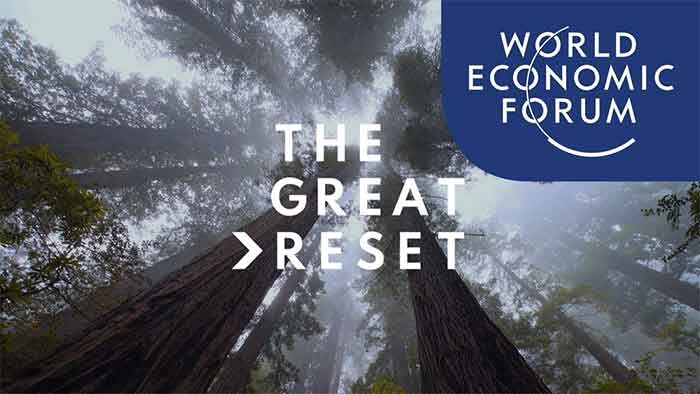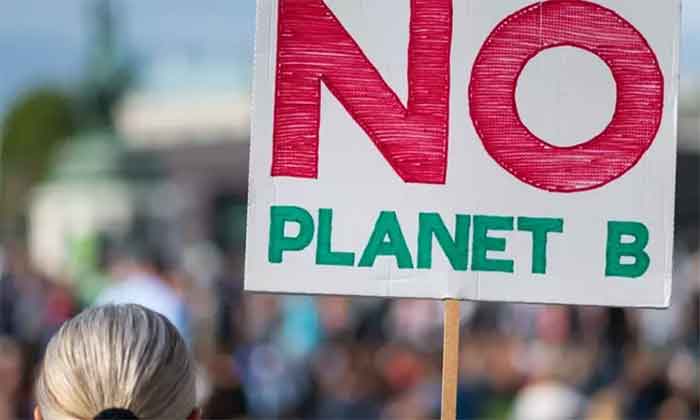
Series Note: We are in the middle of an unprecedented crisis as the Covid-19 pandemic, and the lockdowns implemented in response, continue to deliver a series of economic, social and psychological shocks to the world. In this time of chaos, some of the world’s most powerful interest groups have stepped forward claiming that this crisis presents an opportunity to ‘reset’ the world’s systems.
Leading the charge is Geneva-based World Economic Forum (WEF) with its ‘Great Reset’ initiative, an ambitious plan to shape the contours of the post-Covid world. This three-part series critically examines the origin, workings and implications of the Great Reset agenda, which its critics have denounced as the corporate capture of global governance and the global commons.
The second part traces the origins of the Great Reset, setting it in the context of the WEF’s own history and its persistent efforts to dictate world affairs on behalf of its corporate benefactors.
Read Part 1: When the ‘Fourth Industrial Revolution’ comes knocking
For decades, the World Economic Forum has been trying to influence global policy in favour of the world’s financial super-elite. Thanks to the global crisis unleashed by the pandemic and lockdowns, it may finally have found a way to do it.
The World Economic Forum (WEF), a non-profit based in Geneva, states its mission as being “committed to improving the state of the world by engaging business, political, academic, and other leaders of society to shape global, regional, and industry agendas.” Over the years, the annual WEF meeting held at Davos-Klosters, a Swiss mountain resort, has emerged as the world’s most prestigious gathering for its financial, technological and political elites.
The list of attendees for Davos 2020 (the 2021 event was held virtually) reads like no other; counting in it just about every major head of state from Donald Trump to Narendra Modi, heads of major multilateral organisations, some of the world’s biggest investors, representatives of major banking firms, leading lights from the worlds of economics, technology and law, as well as top executives of Fortune 500 companies, all of which, incidentally, are official partners of the WEF. In a display of the WEF’s global reach, the event was accompanied by virtual events in 430 cities across the world, pulling in thousands more attendees.
Later that year, as the world reeled from a series of unprecedented blows in the form of Covid-19, the lockdowns and the resultant social and economic crises, the WEF stepped into the vacuum created by these events to announce its ‘Great Reset’ initiative, the single most decisive and ambitious attempt by any organisation to shape the contours of the post-lockdown world.
What’s so great about The Great Reset?
Officially, the WEF describes the Great Reset as “a commitment to jointly and urgently build the foundations of our economic and social system for a more fair, sustainable and resilient future.” On the surface, this seems like a commendable attempt to give direction and focus to the world in a time of chaos. Such is the vision articulated by Klaus Schwab, founder and executive chairman of the WEF, which held its 2021 summit on the theme of the Great Reset.
According to Schwab, in a world beset by a host of economic, social and environmental challenges, “The Covid-19 crisis has shown us that our old systems are not fit any more for the 21st century. We have to restore a functioning system of smart global cooperation structured to address the challenges of the next 50 years.” He called for the world to “act jointly and swiftly to revamp all aspects of our societies and economies, from education to social contracts and working conditions. Every country, from the United States to China, must participate, and every industry, from oil and gas to tech, must be transformed. In short, we need a “Great Reset” of capitalism.”
Echoing these sentiments, Prince Charles, who announced the event along with Schwab, said, “In order to secure our future and to prosper, we need to evolve our economic model and put people and planet at the heart of global value creation.” António Guterres, Secretary-General of the United Nations, chimed in, “The Great Reset is a welcome recognition that this human tragedy must be a wake-up call. We must build more equal, inclusive and sustainable economies and societies that are more resilient in the face of pandemics, climate change and the many other global changes we face.”
In many ways, this rhetoric is indistinguishable from the language of bland do-goodism found in the proceedings of the United Nations or reports by international NGOs. But beyond rhetoric, what does the Great Reset have in store for the world, at least, as its originators would have it?
The gameplan
How does the WEF imagine it would actually work itself out in terms of policies and institutional and structural changes? Here is how Schwab, who has personally conceptualised the Great Reset, and has even published a book on it explaining his ideas, describes its three main components:
Stakeholder economy: The first component consists of government policies that would steer the market toward “fairer outcomes”, ultimately to build a “stakeholder economy.” This calls for, among other things, improved government coordination (for example, in tax, regulatory, and fiscal policy), new rules governing intellectual property, trade, and competition, and reforms that promote more equitable outcomes, such as wealth taxes.
Shared goals: The second component of the Great Reset agenda is to ensure that investments advance shared goals that benefit the world at large. Among other things, this calls for the ambitious economic-stimulus plans announced by most major countries, as well as investments from private entities and pension funds, to be used to build a new, “socially equitable and environmentally sustainable global economy” that works in the long term.
Technology governance: The third priority of the Great Reset is to manage and direct the ‘Fourth Industrial Revolution,’ so that its disruptive impacts are minimised, and its benefits maximised. Among other things, the WEF calls for greater collaboration between governments, corporations, universities, research institutions etc., to achieve this. (The WEF’s advocacy of the Fourth Industrial Revolution or Industry 4.0 was covered in detail in the first part of this series).
The Great Reheat?
Schwab’s book outlining his vision of the Great Reset has been touted as “the first policy book on the Covid crisis globally.” But given how comprehensively it deals with just about every aspect of governance and the economy, it’s clear that there’s more to it than meets the eye.
Not surprising then, that it was published as early as June 2020, when the world was still reeling from the lockdowns. It’s actually a much-reheated dish, which recycles many of the ideas Schwab and the WEF has been championing for decades through a number of publications and events over the years. Of special interest among these is a 600-page report released as part of the WEF’s ‘Global Redesign Initiative,’ organised along with the United Nations in the aftermath of the 2008 financial crisis, and described as “the most comprehensive proposal for re-designing global governance since the formulation of the U.N.”
All of the WEF’s proposals have more or less the same official line: a radical transformation of global systems in line with new technological, political and environmental realities. What is never mentioned is that this transformation, conceived and promoted by technocrats such as Schwab, and sponsored by global financial powers whose interests it is meant to serve, is to be executed top-down, ignoring democratic norms and bypassing parliament and other public institutions; a process euphemistically called ‘public-private partnership.’
The Great Reset in action
The WEF’s high profile but exclusive annual Davos event, now the top draw for political and policy leaders around the globe, is the most significant conduit through which the organisation influences government policies worldwide. Thanks to the intense media buzz it creates around these events, they also play a huge role in influencing the general public with the ideas it wants to promote.
At the moment, the WEF is actively injecting the idea of a ‘Great Reset’ into the mainstream through slickly produced video features and podcasts targeting the general public, apart from major features in such favoured outlets as The Economist and Time magazine. In fact, Time’s special issue on Davos 2020 was produced in partnership with the World Economic Forum (not coincidentally, Time’s owner Marc Benioff sits on the WEF board).
The WEF is also increasingly playing a hands-on role when it comes to the implementation of its agenda through a range of ‘strategic partnerships’ and affiliate programmes such as Global Shapers, Young Global Leaders and UpLink Platform which cover not just manufacturing and trade, but every field from governance to agriculture to health.
A particularly ambitious effort is its Fourth Industrial Revolution Network, which opened its India Centre in Mumbai in 2018, in partnership with NITI Aayog, India’s apex planning body, explicitly defining its mission as to “co-design, test and refine governance protocols and policy frameworks” that enable Industry 4.0.
Corporate capture of global governance
The true significance of the Great Reset cannot be understood without knowing the history and agenda of its originator. The WEF started life in 1971 as the European Management Forum, the brainchild of Schwab, then a business professor at the University of Geneva. It later broadened its invitee list to include political leaders and its agenda to include “resolving international conflicts.” Afterwards, it introduced a membership system for the world’s 1,000 leading companies, and in 1987, changed its name to ‘World Economic Forum.’
Even though it claims to be “independent, impartial and not tied to any special interests,” by way of disclaimer, the fact is that the WEF organisation is the premier mouthpiece for global financial and corporate elites today. It’s a central player in a tightly-knit web of privately funded mega ‘non-profits’, ‘think tanks’ and assorted lobbying organisations through which the world’s power elite seek to shape policies and events to their advantage.
However, the WEF is not just any industry lobbying group. It can be argued that especially in the last decade or so, the Davos events have almost become a de facto world parliament, eclipsing even the UN General Assembly meetings in the breadth and depth of influence and prestige it commands.
Not content to project itself as a kind of faux-U.N. for plutocrats, in 2019 the WEF went one step ahead and signed a memorandum of understanding (MOU) to officially partner with the U.N. The move was widely condemned by hundreds of leading civil society organisations, who denounced it as “corporate capture of global governance,” which they said “delegitimises the U.N. and weakens the role of states in global decision-making.”
Furthermore, they point out that the agreement grants transnational corporations (not coincidentally, all WEF members) preferential access to the UN System, at the expense of states and public interest actors. A key component of the agreement are public-private partnerships to globally deliver public goods in many fields, including education, financing, climate change, and health.
The WEF calls itself “the international organisation for public-private cooperation.” As it turns out, their use of the definite article ‘the’ is more significant than it appears. One commentator recalled how the WEF’s Global Redesign Initiative report had “recommended a sort of public-private United “Nations” – something that has now been formalised in this MoU.”
Backed as it is by the full weight of some of the world’s most powerful financial interests and technology corporations, the Great Reset is more than a theoretical construct or a techno-fantasy woven on the magic mountain of Davos.
And given the evident compliance of political and policy elites to this agenda, it very much has the power to remake the world in its image.
(To be continued)
Sajai Jose is a freelance journalist
Originally published in NewsClick
GET COUNTERCURRENTS DAILY NEWSLETTER STRAIGHT TO YOUR INBOX
















































